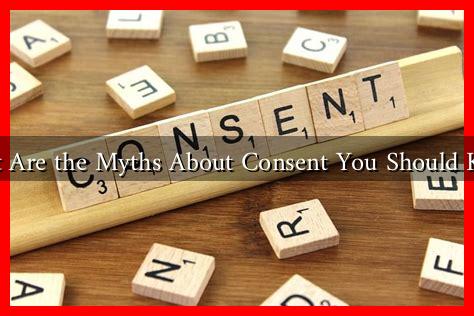-
Table of Contents
What Are the Myths About Consent You Should Know
Consent is a fundamental aspect of any healthy relationship, yet it is often misunderstood. Misconceptions about consent can lead to serious consequences, including sexual violence and relationship breakdowns. This article aims to debunk common myths surrounding consent, providing clarity and understanding to foster healthier interactions.
Understanding Consent
Before diving into the myths, it’s essential to define what consent is. Consent is an agreement between participants to engage in a specific activity. It must be informed, voluntary, and reversible. Understanding these principles is crucial for recognizing the importance of consent in various contexts, particularly in sexual relationships.
Common Myths About Consent
Here are some prevalent myths about consent that need to be addressed:
- Myth 1: Consent is implied by previous sexual activity.
- Myth 2: Silence or lack of resistance means consent.
- Myth 3: Consent can be given under pressure.
- Myth 4: Only women need to give consent.
- Myth 5: Consent can be given when intoxicated.
Many people believe that if they have engaged in sexual activity with someone before, they have an ongoing right to do so again. This is false. Consent must be obtained for each encounter, regardless of past experiences.
Some assume that if a person does not verbally say “no” or physically resist, they are consenting. However, consent must be clearly communicated and cannot be assumed from silence or passivity.
Consent obtained through coercion, manipulation, or threats is not valid. True consent is given freely and without any form of pressure. For example, if someone feels they must agree to sexual activity to avoid conflict, that is not genuine consent.
Consent is a mutual agreement that involves all parties, regardless of gender. Both men and women must communicate their willingness to engage in any sexual activity.
While intoxication can complicate situations, individuals who are significantly impaired may not be in a position to give informed consent. It is crucial to assess the level of sobriety and ensure that all parties are capable of making sound decisions.
Statistics Highlighting the Importance of Consent
Understanding the myths surrounding consent is vital, especially when considering the statistics related to sexual violence:
- According to the National Sexual Violence Resource Center, 1 in 5 women and 1 in 71 men will be raped at some point in their lives.
- The Rape, Abuse & Incest National Network (RAINN) reports that 8 out of 10 sexual assaults are committed by someone the victim knows.
- Only 5 out of every 1,000 perpetrators will end up in prison, highlighting the need for better education on consent and accountability.
Case Studies: Real-Life Implications of Consent Misunderstandings
Several high-profile cases have brought the issue of consent into the public eye, illustrating the dire consequences of misunderstanding consent:
- The Stanford Rape Case (2016): This case involved a college student who was convicted of sexually assaulting an unconscious woman. The defense argued that the woman did not resist, highlighting the myth that silence equates to consent. The case sparked national outrage and discussions about the importance of clear, affirmative consent.
- The Aziz Ansari Incident (2018): In this case, a woman accused the comedian of sexual misconduct after a date. The incident raised questions about consent, communication, and the gray areas of sexual encounters, emphasizing the need for ongoing conversations about what constitutes consent.
Conclusion: The Importance of Clear Communication
Understanding consent is crucial for fostering healthy relationships and preventing sexual violence. By debunking common myths, we can promote a culture of respect and clear communication. Remember, consent is not just a one-time agreement; it is an ongoing conversation that requires mutual understanding and respect. For more information on consent and healthy relationships, consider visiting resources like RAINN or NSVRC.
By educating ourselves and others about the realities of consent, we can create safer environments for everyone.

